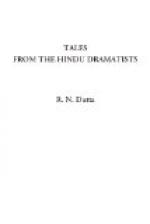VISAKHADATTA.
Visakhadatta or Visakhadeva is the author of Mudrarakshasa. We learn from the Introduction to the drama that Visakhadatta was the son of Prithu and grandson of Vatesvaradatta—a Samanta or subordinate chief Professor Wilson was inclined to think that Maharaja Prithu might be the Chouhan Prince Prithu Rai of Ajmir; but he himself pointed out that the Chouhan Prince was never called Maharaja; and that the name Nateswara Datta would present a serious difficulty in the way of identifying the poet’s father with the Chouhan Prince Prithu Rai of Ajmir. It will also appear that the author of the drama lived in a century which is prior to the age of Prithu Rai of Ajmir by centuries. He was in all probability a native of Northern India. The grandson of a tributary chief and the son of a Maharaja he was well-skilled in state-craft and made a special study of stratagems and crooked policies; in consequence of which the bent of his mind was mainly directed to business and did not indulge in sentiments. The effect of it is manifest in his poetry which is business-like and vigorous, but lacks in sweetness, beauty and the tender emotions.
YAYATI CHARITA.
The author may possibly be Pratapa Rudra Deva, sovereign of Telingana in the beginning of the fourteenth century.
DUTANGADA.
It is said to have been written for the yatra of Kumar Pala Deva, by order of Tribhuvana Pala Deva, by the poet Subhata.
DHANANJAYA VIJAYA.
It is the composition of Kanchana Acharya, the son of Narayana, a celebrated teacher of the yoga, of the race of Kapi Muni.
MRIGANKALEKHA.
The drama was composed by Viswanath, the son of Trimala Deva, originally from the banks of the Godaveri, but residing at Benares, where it was represented at the yatra, or festival, of Visweswara, the form under which Siva is particularly worshipped in that city.
KAUTUKA SERVASWA.
This is a Prahasana or Farce, and is especially a satire upon princes who addict themselves to idleness and sensuality, and fail to patronize the Brahmans.
It was composed by a Pandit named Gopinath for representation at the autumnal festival of the Durga Puja.
CHITRA YAJNA.
This heterogeneous composition is the work of a Pandit of Nadiya, Vaidyanath Vachespati Bhattacharya, and was composed for the festival of Govinda, by desire of Iswar Chandra, the Raja of Nadiya.
HASYARNAVA.
This comic play is a severe but grossly indelicate satire upon the profligacy of Brahmans assuming the character of religious mendicants. It satirizes also the encouragement given to vice by princes, the inefficacy of ministers, and the ignorance of physicians and astrologers.




